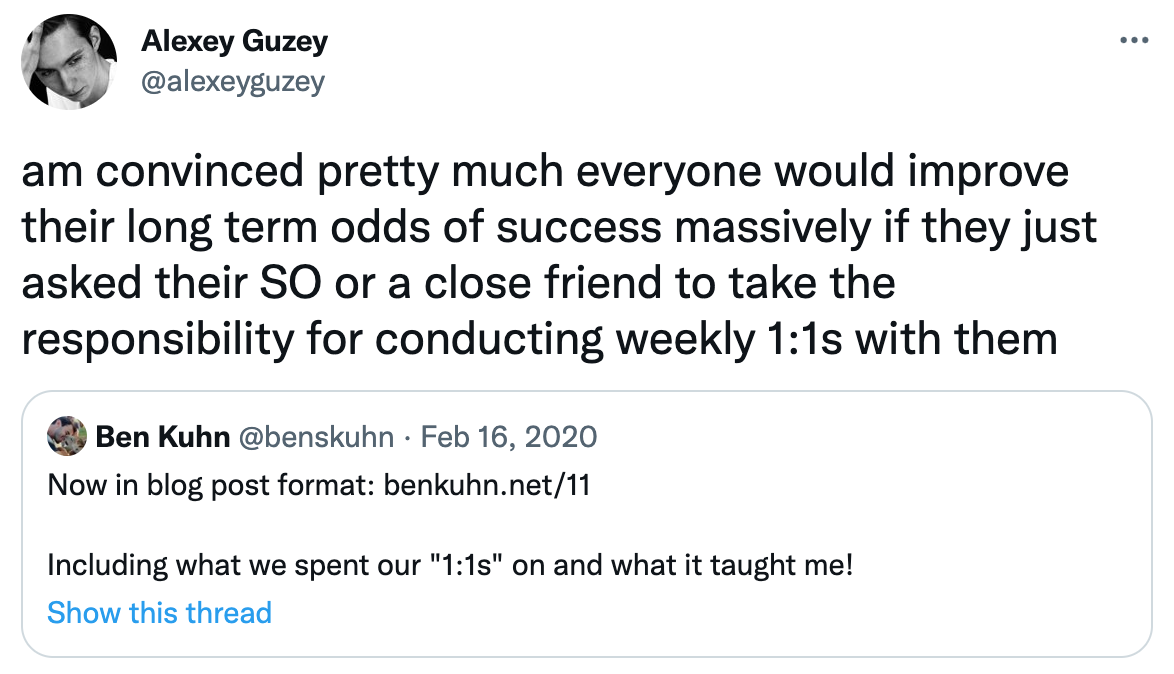One-on-Ones: Experiences and Suggestions
Experiences and suggestions on conducting 1:1 meetings with a partner.
Contents
Inception
In February 2020, I stumbled upon Alexey Guzey's Twitter, where the first tweet I saw was his supporting of Ben Kuhn's 1:1 blog post:

This concept was something I had been considering for some time, but never got around to actually setting up. I wanted someone I could bounce ideas off of and get honest feedback, not "great idea, buddy!"; to call me out on my nonsense when I need to be; to improve my thinking and reasoning. No one in my friend group or family—immediate or extended—has similar interests to me, nor would any of them be interested in doing something like this.
The community I find myself most in-line with is that of Slate Star Codex, specifically its subreddit. So, I posted a partner-finding thread, encouraging anyone interested in starting 1:1s to post their info (age, gender, brief personal description, time commitment, expectations from the sessions) to advertise for potential partners. There were a few responses, and I got a private message a few hours later from one of the posters. We both agreed that we were compatible with each other, so a voice call was set up for the following week. The rest is history (read: we became partners and still do 1:1s on a weekly basis).
Partner
The ideal partner should have a few traits (in order of importance):
-
Empathy: When discussing issues, they don't dismiss them, but rather try and help you work through them. You should feel comfortable telling them personal things (obviously depth is up to you) without fear of being belittled or judged.
-
Honesty: One of the main purposes of 1:1's is getting feedback on ideas, work, and other things in your life. It's incredibly important that this feedback is honest: if an idea is terrible, let it be known.
-
Intelligence: Ideas can be built upon by the partner, which requires understanding of the initial idea, which requires intelligence.
-
Life Experience: Having diverse life experience or knowledge allows diverse feedback.
Outside of these traits, it helps to just get along with them. Similar senses of humor, interests, etc., only serve to make the session more enjoyable and productive.
The format we use is quite simple.
-
Review the past week of each our lives. Any notable events, the status of our to-do items from the previous meeting, and anything else on our minds, important or trivial. Questions are asked by both of us.
-
Discuss any ideas we are currently thinking about.
-
Create a plan for next week that may include incomplete to-do items from the previous meeting, items to progress the idea(s) we discussed, and to-do items for the upcoming week.
We meet at the same time every week unless there is a conflict, in which case the meeting is rescheduled or postponed until the following week.
Benefits
The biggest benefit is the second prospective the partner provides. Like most people, I have a certain way of examining and thinking about things that can be beneficial in some situations, but detrimental in others. Having a partner to check my thinking allows the idea to be improved upon or flaws to be found more easily.
Accountability is the second biggest benefit. While my partner and I don't hold each other strictly accountable for each other's to-do's, I feel more inclined to complete my to-do's because I've told my partner about them. Strict accountability is still an option.
Finally, you get another friend or closer to a current one.
Examples
A few examples of ways that my 1:1 partner has helped me:
-
Spurring me to start this website. I was on the edge but leaning towards keeping everything in OneNote when he encouraged me to start this. Developing this website has improved my life dramatically.
-
Suggested things I may not have or never would have found otherwise. I started reading Yudkowsky's The Sequences, learned about meditation, and got new productivity ideas (Weekend Wednesday, bureaucracy and sprint days).
-
Adopted behaviors and heuristics. A few examples:
-
I now only consume news that a) affects me, and b) I think will be discussed in 100 years.
-
Rule of 3 transgressions: If someone does something offensive once, gently explain to them their fault. If they do it a second time, less gently remind them of the first explanation. If they do it a third time, even less gently remind them of the first two explanations. If they do it a fourth time, all bets are off.
While some of these aren't necessarily major life changes, they are positive changes nonetheless, and make a significant difference over the long run.
Questions
Some questions/subjects I've asked my partner about:
-
Does working on Saturday make myself look better (due to more commitment to job/company) or worse (only a bit more output for more-than-proportional time)?
-
Methods of installing TAPs
-
Implementing mindfulness throughout the day
-
Splitting my workday into 4-4 or 6-2 to get more sunlight/outside availability
-
Experiment designs
-
Inter-office dating
-
Being intolerant of intolerance
-
How to approach a meeting with a congressman
-
Marriage and children as a contributor or subtractor of happiness
-
FIRE
Posts Supporting 1:1s
See Also
-
Mastermind group: Peer-to-peer mentoring group used to help members solve their problems with input and advice from the other group members.
-
Life Improvements: Items and practices that have improved my life.
